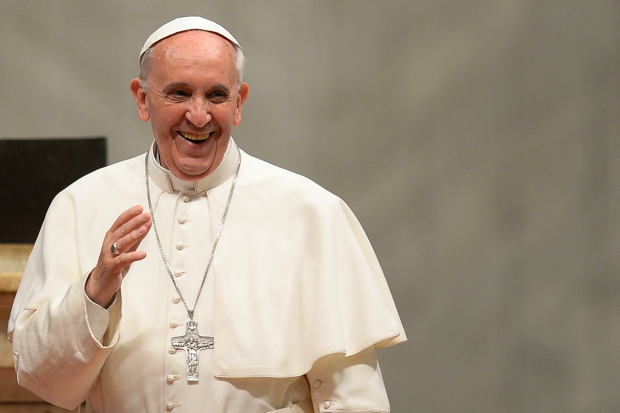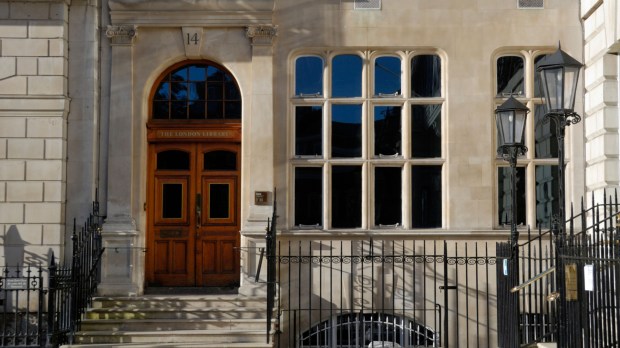‘Show, don’t tell’ is the mantra of PR advisers when telling public figures how to communicate. Pope Francis’s technique does both at once. By confessing his sins to what the media call ‘an ordinary priest’ in St Peter’s basilica without entering the confessional box, he seemed almost to be boasting that he is, like everyone, a sinner. I hope he does not take it into his head to make public the content as well as the fact of his confession. That would be what the Twitter generation calls TMI. But the gesture of openness worked. It helped to remind people that confession, far from being — as suggested by John Cornwell’s new book The Dark Box — a weird rite designed to encourage paedophilia, is a way of lightening the heart. Sins are unloveable: sinners aren’t. So it is good to wipe away the first and forgive the second. Holy Week, of course, is the season when people are most inclined to confess. On Monday night, in our local Catholic church, there was a special service of penitence, followed by individual confessions. Thanks perhaps to Pope Francis, the atmosphere was cheerful. I must confess — if it requires confession — that I enjoyed it.
A friend has sent me a copy of a memo sent by the Financial Secretary to the Treasury (William Glenvil Hall) to the Chancellor of the Exchequer (Hugh Dalton) on 19 September 1945. It discusses the salaries and expenses of MPs and ministers. At that time, MPs received £600 a year (roughly £22,000 today). The memo recommends no increase. It argues, however, that free travel facilities should be extended to allow Members to travel between London and their homes (generally assumed not to be in their constituencies), and that ‘consideration should be given’ to ‘providing a secretarial service to Members at reasonable rates’. It points out that legitimate parliamentary expenses can be set off by MPs against income tax. ‘Free postage should not be granted’, it also states. Today, of course, all such things are given gratis and MPs earn £66,396 p.a., so they have become much more unpopular. Perhaps the key underlying assumption behind this austere memo is that MPs can (and, by implication, should) earn money from other sources. Nothing has depressed me more in the latest expenses row than the description of MPs (by an MP) as ‘650 public servants’. They should serve the public, yes, but they should not be state employees. If the state alone pays them, the state alone controls them. The voters, in turn, notice this and resent it. Any MP will understand his country better if he has to earn his own living in it, and it is rubbish to say that he/she does not have the time. Because of ‘family-friendly’ hours and the fact that the coalition (thank goodness) does not want to make tricky new laws before the election, many MPs are currently working in Parliament less than three days a week for less than eight months of the year.
On Monday morning, I spoke to Paul Gould, a dairy farmer from North Dorset. That afternoon, he was sending off 36 of his 160 British Friesian cows to be slaughtered. They had tested positive for TB. Four generations of Mr Gould’s family have farmed in the same place since 1931. His is and always has been a closed herd. So his cattle have never had any contact with any outsiders. One of his cows has a daughter, a granddaughter, a great-granddaughter and a great-great-granddaughter in the current herd. He has numerous badger setts on his farm. There are far more badgers, because they are protected, than of old. He and his vet agree that the badgers offer the only possible explanation for the TB, though they cannot prove it because ‘no one now tests badgers for the disease, not even road-kill’. He cannot sell any cattle until the next round of expensive tests, or possibly the round after that (60 days later). His cows calve in August/September, so they may have no value and might have to be shot. Mr Gould wants a badger cull (for which his area, as the selected ‘reserve pilot’, is ready), pointing out that TB is a horrible death for the badgers too. But the cull has been sacrificed to coalition politics. As Mr Gould says, ‘It’s not right.’
Much speculation where we live about the identity of the Stonegate fare-dodger, one stop up our railway line. He recently paid £43,000 to Southeastern, the franchise holder, to escape criminal charges after five years of constant cheating on his daily commute to London. Obviously no suspicion falls on such fine local citizens as my fellow former editor of this paper, Dominic Lawson, who uses the station, or the great writer Adam Nicolson, or the distinguished actor Robert Bathurst. It would be appalling lèse-majesté if aspersions were to be cast on Paul Dacre, the editor of the Daily Mail, who lives nearby. The guilty man is reported to be a hedge-fund manager. There is anger that he has bought anonymity by paying up in full when caught. Because he is unnamed, all the no-doubt numerous, blameless hedge-fund managers who commute from Stonegate are being made to feel awkward. Television cameras film the station. Gossip keeps identifying suspects (‘Can’t be anyone from the village: must be someone from the Heathfield direction.’ ‘What about X? Oh no, can’t be him: he always goes by helicopter.’) Possibly the resentment is tinged with envy that he travelled free for so long. The fact that it costs £43,000 to go to London five times a week for five years is the most shocking part of the story.
Here is my latest startling fact from the Great War. Although conscription did not come in until 1916, Colin Dauris writes to say that his grandfather, George England, was ship’s chief cook on the Blue Star passenger vessel Viking when it was requisitioned by the Admiralty in August 1914 and renamed HMS Viknor. The crew were made to continue. In January 1915, the Viknor was sunk by a mine near Tory Island, off the coast of Donegal, and all the nearly 300 hands, including England, were lost.
Got something to add? Join the discussion and comment below.
Get 10 issues for just $10
Subscribe to The Spectator Australia today for the next 10 magazine issues, plus full online access, for just $10.
You might disagree with half of it, but you’ll enjoy reading all of it. Try your first month for free, then just $2 a week for the remainder of your first year.















Comments
Don't miss out
Join the conversation with other Spectator Australia readers. Subscribe to leave a comment.
SUBSCRIBEAlready a subscriber? Log in